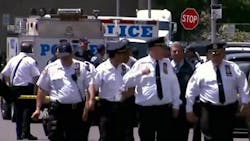More Police Officers Now Walking Beats
New York is adding 1,300 officers, the first expansion of its police force in two decades. San Francisco is looking to swell its ranks by 400 officers. Seven out of 10 cities in the U.S. are increasing their spending on public safety, according to the National League of Cities.
The surge means departments can assign more officers to crime-prevention and community policing programs that were slashed. It comes as city leaders are struggling to repair relationships between law enforcement and minority communities after killings by police and civil unrest in New York, Baltimore and Ferguson, Mo.
“If officers are just running from call to call to call, they haven’t got time to get to know the people in their neighborhoods, they haven’t got time to be walking beats, they’re running all the time,” said Jim Pasco, executive director of the Fraternal Order of Police, a labor organization with 325,000 members. “Effective policing is labor-intensive. You can’t do that with more cameras or more street lights. You need more police officers.”
U.S. cities saddled with growing public-employee pension costs cut police budgets and staffing during the recession to stay afloat. The number of cops in the U.S declined 14 percent between 2009 and 2013, according to Federal Bureau of Investigation figures.
Making matters worse was an $880 million, or 42 percent, cut in Justice Department law-enforcement grants in the last four years, according to data from the Federal Funds Information for States, which tracks such payments. Federal funding for community-oriented policing dropped to $214 million from $792 million in 2010, a 73 percent decline.
“It’s a mixture of cities wanting to add police, but also trying to get back to the place where they were prior to the Great Recession,” said Brooks Rainwater, the National League of Cities’ director of city solutions and applied research. “I expect the trend to continue as budgets come back and cities have more funding.”
In New York, Mayor Bill de Blasio last month bowed to pressure from his city council when he unveiled a budget that included $170 million to add almost 1,300 staff to the 35,000- officer force. The expansion comes after almost six months in which homicides increased compared with the same period last year.
The plan calls for 1,000 veteran police officers to walk beats in some of the most crime-ridden neighborhoods. About 300 others will be permanently assigned to a rapid-deployment force as a boost to the 1,000-officer counterintelligence division. An additional 400 cops on desk duty will be freed to work patrols, their positions filled by civilians, de Blasio said.
“We are taking policing to the next level in this city, both in terms of deepening our safety and creating a true partnership between police and community,” de Blasio, 54, said June 25 at a news briefing in Manhattan.
In San Francisco, Mayor Ed Lee proposed a $1.1 billion, two-year budget for his police department that includes hiring additional officers. It comes as property crimes in the city have increased 39 percent in the last four years, and violent crimes have grown 17 percent, according to FBI data.
“The mere presence alone is a deterrent to crime,” said Officer Albie Esparza, a San Francisco police spokesman. “By having this increased staffing, we’re able to conduct operations that would deter property and vehicle crime that’s going up.”
Other cities, including Pittsburgh and formerly bankrupt Stockton, Calif., are also steering more funding to police hiring, said Daniel Lawrence, research associate at the Urban Institute, a public policy research organization in Washington. Still, he said boosting staff levels is not necessarily the most effective crime-fighting tool.
“It’s the policing strategies and the relationships with the community that are more important than the numbers of the police force,” he said. “Just because you have a large police force that is proactively addressing crime doesn’t mean that you’ll have a strong reduction in crime.”
(Henry Goldman in New York contributed to this report.)
Copyright 2015 Bloomberg News
Visit Bloomberg News at www.bloomberg.com
Distributed by Tribune Content Agency, LLC.
